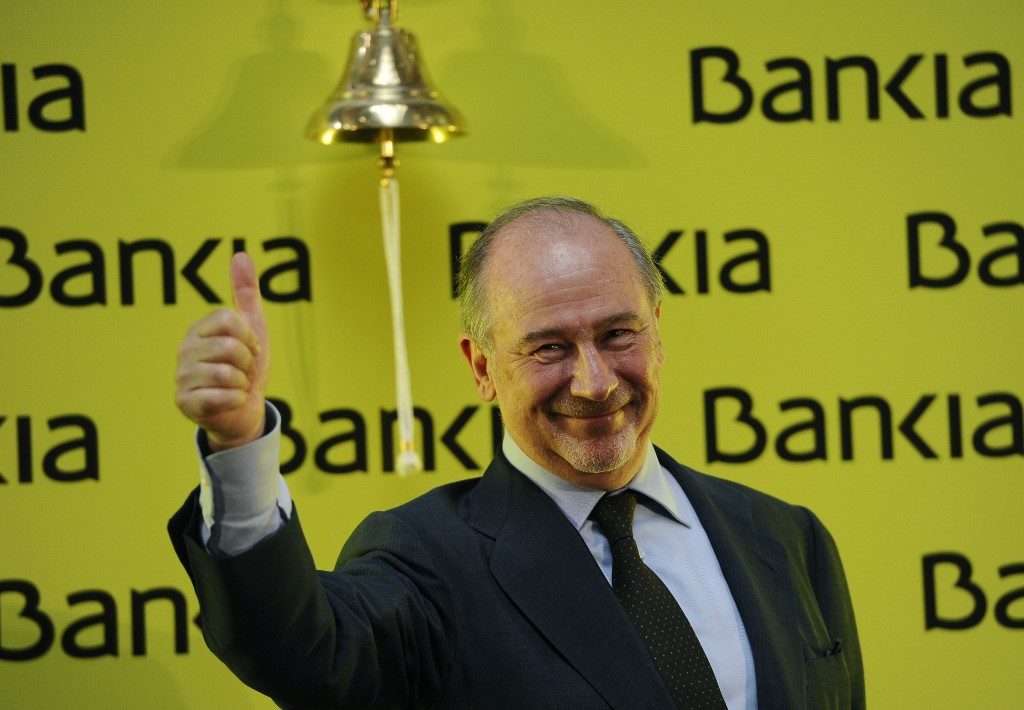SUMMARY
This is AI generated summarization, which may have errors. For context, always refer to the full article.

A Spanish court on Tuesday, September 29, acquitted former International Monetary Fund (IMF) chief Rodrigo Rato and all other defendants of fraud and falsifying the books during the 2011 flotation of Spain’s Bankia, a symbol of the country’s banking crisis.
Presented as a prosperous business, Bankia’s listing was very popular with small investors who rushed to buy share packages, only to see their savings disappear when the bank teetered on the edge of bankruptcy just one year later.
The National Court, which handles major criminal cases, had been tasked with deciding whether Rato and other defendants had knowingly deceived investors into buying shares by presenting a misleading image of the bank.
But it concluded Bankia’s stock listing had received approvals “from all necessary institutions.”
The state was forced to nationalize the bank and inject 22 billion euros ($25.7 billion) in 2012 to keep it from collapsing at a time when the Spanish economy was mired in crisis.
That in turn prompted Spain to borrow 41 billion euros from the European Union to keep the rest of the country’s banking sector afloat as investor confidence had been shaken.
Rato, 71, who had headed up the IMF from 2004 to 2007, led the merger in 2010 of Caja Madrid, which he ran at the time, and 6 other struggling regional savings banks into Bankia.
The image of a smiling Rato ringing the bell and sipping champagne on July 20, 2011 to mark the start of Bankia’s listing has since become a symbol of the scandal.
More than 300,000 small shareholders bought share packages for a minimum of 1,000 euros, attracted by a major advertising campaign and the profits boasted by the bank.
But in 2012, after a disastrous year that saw its share price collapse, the bank admitted that in the year it listed, it had actually made a loss of close to 3 billion euros.
‘Shameful’
Rato, head of the bank at the time, was accused of cooking the books and fraud to the detriment of investors. He faced a jail sentence of 8 and a half years if he had been convicted.
The 31 other people and entities also on trial, among them Bankia, were also cleared.
In its ruling, the court said the prospectus for the listing contained “more than sufficient information for investors…to form a reasoned opinion on the value of the company” and contained a “comprehensive and clear description of the risks.”
It also argued that the procedure which led to Bankia’s listing was “intensely and successfully supervised” by the Bank of Spain and financial market authorities which approved it.
During the trial, Rato said Spain’s central bank was fully aware of everything that went on at the lender.
“The Bank of Spain would tell us ‘do this, do that.’ And if at some point we did something they didn’t feel was good, it said no,” he told the court.
A group of activists dubbed “15MpaRato,” which launched one of the first lawsuits that led to the trial, called the ruling “shameful” and said the listing was a “scam.”
Both sides have 5 days to appeal the ruling.
‘Huge fraud’
Manuel Pardos, the head of Spanish consumer group Adicae which has led several legal battles in Spain against practices in the banking sector, called the ruling “inexplicable.”
“The organizers of the huge fraud against Spanish society come out smelling of roses,” he told public television TVE.
The state, which still holds just under 62% of Bankia, has recognized several times that it will never be able to recover much of the money it disbursed.
The directors of Bankia and its rival CaixaBank last month approved a merger to create Spain’s biggest domestic bank by assets. The Spanish state will hold a 16.1% share in the new group.
Since October 2018, Rato has been serving a 4-and-a-half-year sentence for misusing company credit cards for personal expenses while working at Bankia between 2010 and 2012.
Rato was economy minister and deputy prime minister in the conservative government of Jose Maria Aznar from 1996 to 2004, before going on to head the IMF. – Rappler.com
Add a comment
How does this make you feel?





There are no comments yet. Add your comment to start the conversation.